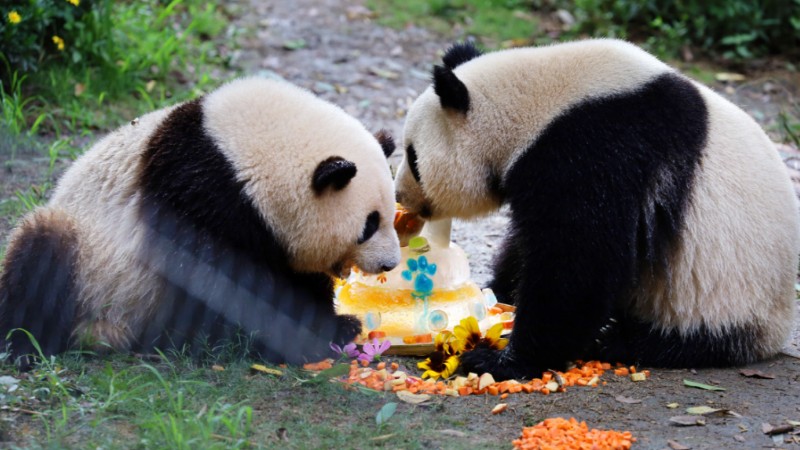Protection efforts see golden snub-nosed monkeys thrive
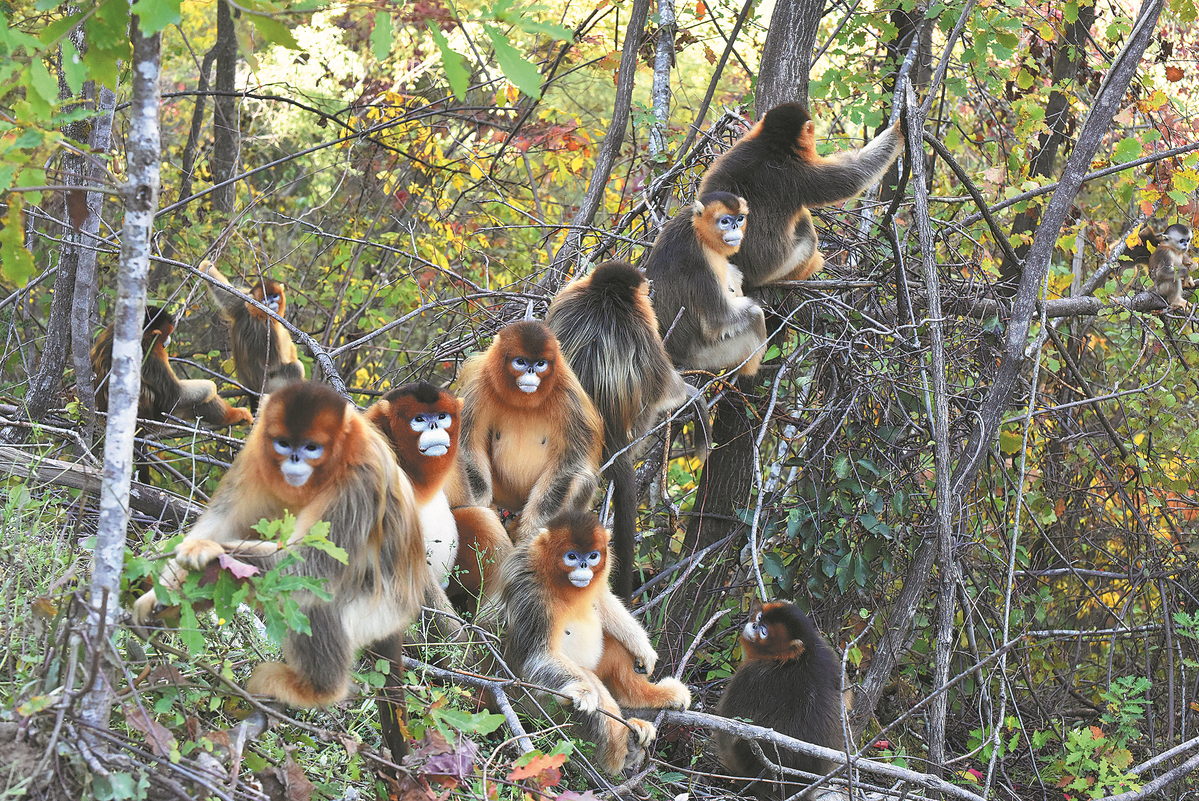
A group of golden snub-nosed monkeys sits on branches in Jiuzhaigou, Sichuan province. TANG YULIN/FOR CHINA DAILY
Editor's note: As protection of the planet's flora, fauna and resources becomes increasingly important, China Daily is publishing a series of stories to illustrate the country's commitment to safeguarding the natural world.
The status of one of China's best-loved primates has recently been lowered from 'vulnerable' to 'near threatened'. Yan Dongjie reports from Jiuzhaigou, Sichuan.
The Tang family has lived in Taiping, a village in the Baihe River National Nature Reserve, Jiuzhaigou county, Sichuan province, for many generations. The villagers have lived alongside golden snub-nosed monkeys for centuries, enjoying a harmonious relationship with the animals and passing down many legends.
"It is said that in ancient times, when a hunter aimed his gun at a monkey, she reflexively grabbed her infant and turned her back to the hunter, as if to say, 'Don't shoot my child.' This legend has been passed down, so local people have never hunted golden snub-nosed monkeys and the animals have settled in this area," Tang Yulin said. "Every villager loves the monkeys. It's a tradition."
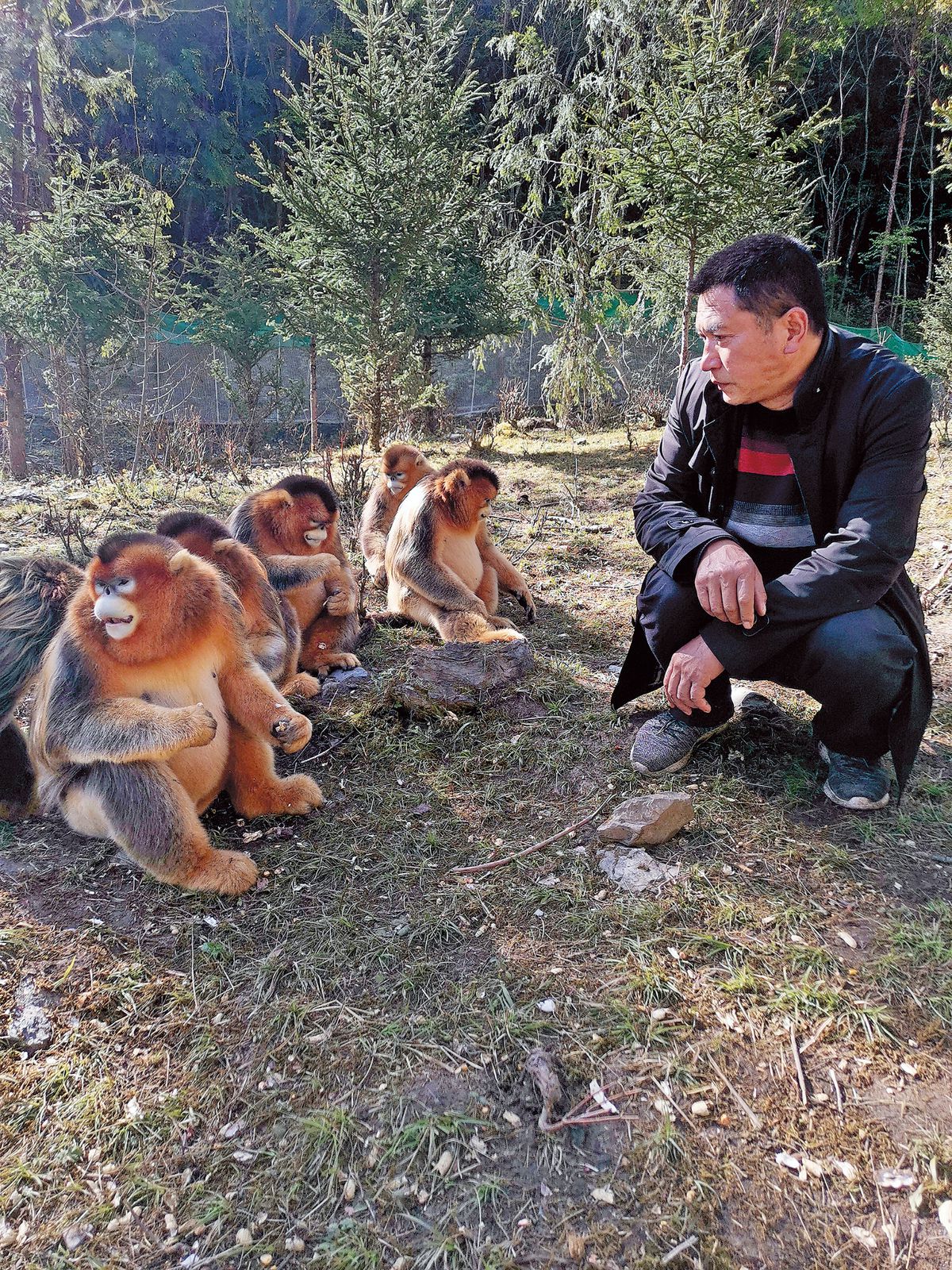
Tang Yulin plays with some monkeys. CHINA DAILY
Tang observed the golden snub-nosed monkeys with his father and great-uncle, who worked in the reserve when he was a child. He believes that, much like humans, the monkeys experience various emotions, to which he is deeply attuned.
He thinks that their calls indicate at least seven emotions: "Pupu" signals laughter; "Jiajia" indicates alarm; "Aiai" is a greeting; "Guga" shows fear; "Wawa" is flirtatious; "Wuwu" suggests happiness; and "Wowo" is the monkey version of shouting.
"Your photos haven't captured the monkeys' beauty. Look how stunning they are," Tang told me, when I visited.
During our conversation, his every word and every gesture reflected his love of the monkeys, as well as his desire for more people to understand and protect them.
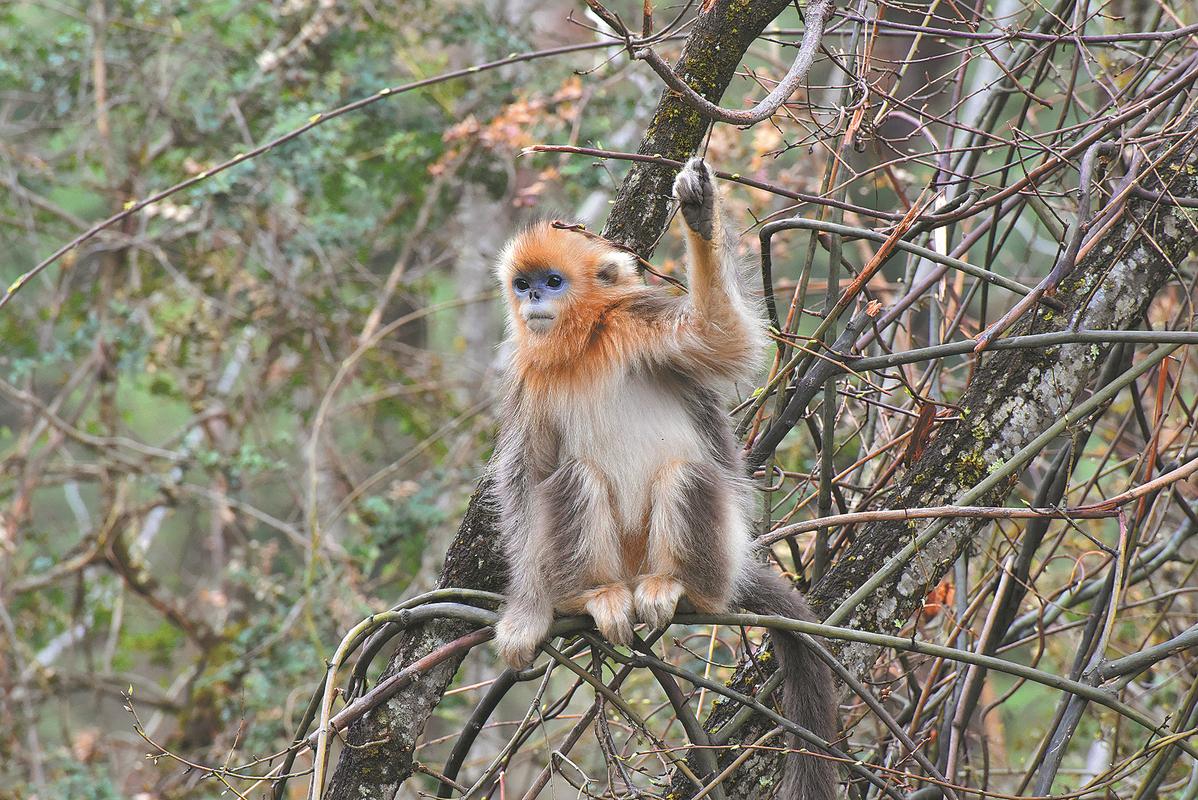
Golden monkey Yuli, who was named by Tang Yulin, sits on a branch. TANG YULIN/FOR CHINA DAILY
Long-term commitment
When the Baihe River National Nature Reserve was established in the 1960s, Tang's great-uncle was one of the first staff members to move there. He spent more than 20 years in the reserve, patrolling the mountains every day, keeping an eye on the monkeys' health, preventing fires and protecting the environment.
Influenced by his family, Tang's father also became a golden monkey expert and worked at the reserve for more than 20 years. Tang is the third generation of his family to work as a forest ranger in the reserve.
He knows every type of plant and tree in the reserve, which has earned him the nickname "the living map".
He said the reserve covers more than 16,000 hectares, while the most recent "census" showed that there were roughly 1,700 golden snub-nosed monkeys living there. They are divided into six communities, each of which is similar to a human village and consists of several families.
Located in Jiuzhaigou county, the reserve overlaps significantly with the Giant Panda National Park, which was established in 2017 as a pilot program.
"There are many nationally protected wild animals in the reserve, such as black bears, antelopes, Tibetan gazelles and giant pandas," Tang said.
"There are also several species of birds under level one State protection, such as Chinese monals and golden eagles."
The golden snub-nosed monkey gets its name from its upturned nose, and is divided into five species: the Sichuan golden monkey; the Yunnan golden monkey; the Guizhou golden monkey; the Nujiang golden monkey; and the Vietnamese golden monkey.
The first three species on the list are unique to China.

Golen monkey Tianye climbs a tree. TANG YULIN/FOR CHINA DAILY
On May 22, the Ministry of Ecology and Environment and the Chinese Academy of Sciences jointly released the Red List of China's Biodiversity: Vertebrate (2020), which downgraded the Sichuan golden monkey's status from "vulnerable" to "near threatened".
The list shows that through the collective efforts of various protection zones in China, the number of Sichuan golden monkeys in the wild has risen from 14,000 in 2002 to about 25,000, while the population's distribution has expanded significantly, which illustrates the success of the conservation efforts.
Tang said that the Baihe reserve has a humid climate and lush vegetation, which serves as a rich source of food for the monkeys, who mainly eat wild plants, fruit and vegetables. They consume tender tree leaves in spring, wild fruit in autumn and tree bark to survive the harsh winter.
"So, protecting the environment here is the best way to protect the Sichuan golden monkey. Fire prevention is a major focus," Tang said, noting that no fires have been reported at the Baihe reserve for more than 40 years.
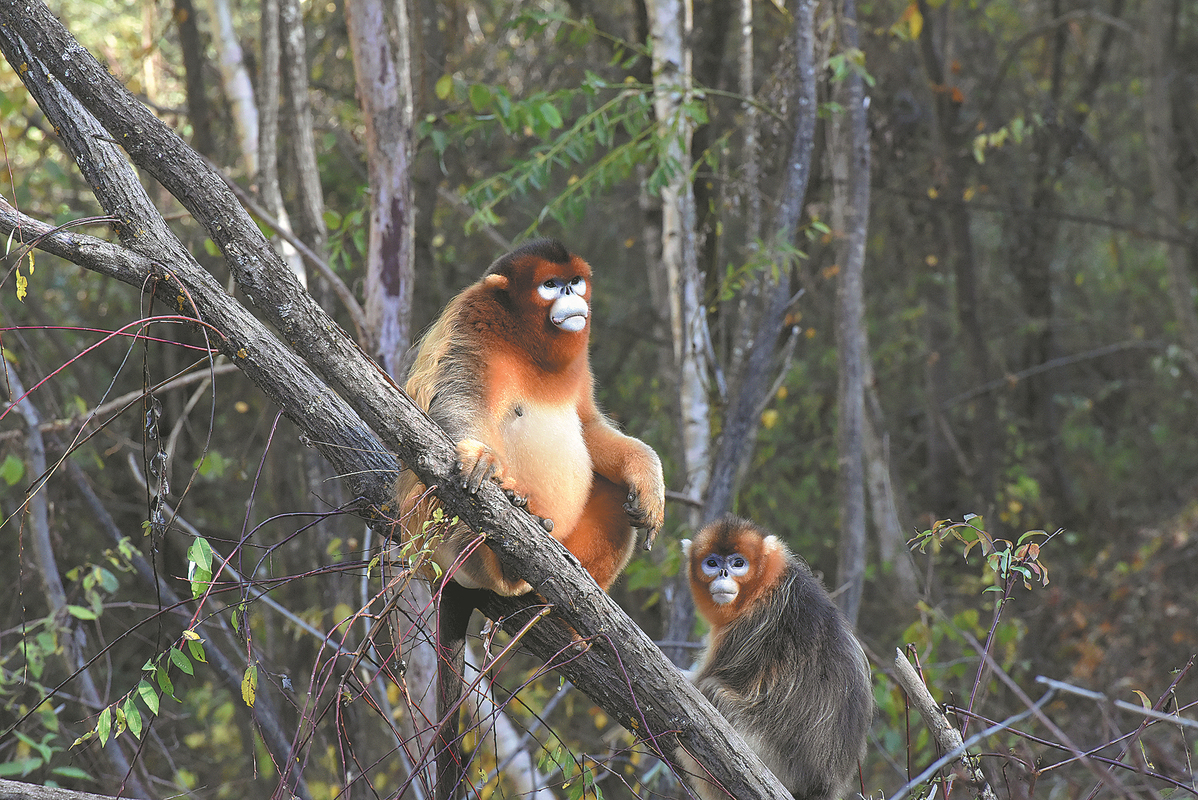
Two golden snub-nosed monkeys sit on a tree in Jiuzhaigou. TANG YULIN/FOR CHINA DAILY
Tightknit species
Tang said that the Sichuan golden monkey is a very tightknit species, and whenever they are attacked by enemies, they fight together.
"On several occasions, I have seen that when a golden eagle tried to catch a monkey, all the monkeys made screeching noises and kept jumping at it one after another to drive it away. Also, when a monkey is injured, others in the group will take care of it," he said.
He recalled that when experts from China and the United States came to the reserve in 1996 to watch and study the monkeys, he helped them observe and record the animals' behavior, gaining a slew of professional knowledge in the process.
"Our camp was located at an altitude of 2,500 meters, and the monkeys lived very close to us, about 300 to 400 meters away. We used binoculars to observe them. I saw that five monkeys were huddled together in the trees every day and did not move. Later, I discovered that the monkey in the middle was sick, and the others were protecting and taking care of him," he said.
Tang said the realization that Sichuan golden monkeys are just like humans — showing emotions and protecting their companions — has deepened his fascination with the species.
Today, the number of Sichuan golden monkeys in the reserve has doubled, compared with the 1980s. Tang said that in addition to protecting the animals, he is thinking about how he can use the reserve's unique natural resources to bring financial benefits to the local people.
However, Mo Cheng, director of the Baihe River National Nature Reserve, struck a note of caution.
"We are very conflicted. The tourism resources here are very good, and we want to open up and bring benefits to the local people, but we are also reluctant to develop because we don't want to damage the plants and animals," he said.
"With the advance of science and technology, we can gradually achieve some reasonable development while ensuring the protection of the environment. That gives us new hope."
Photos
Related Stories
- China ratifies National Ecology Day to enhance public awareness, actions
- China ratifies National Ecology Day to enhance public awareness, actions
- China restores ecology via sci-tech means
- China's ecological conditions continue to improve in 2022
- Xiapu in SE China's Fujian coordinates ecological conservation, economic development
- China strives to advance ecological progress with green, intelligent technologies
- Former fisherman enjoys new role as volunteer river patroller
- China announces top 10 paleontological advances of 2022
- China pursues modernization of harmony between humanity, nature
- China’s Dongying city sees ecological improvements in Yellow River Delta
Copyright © 2023 People's Daily Online. All Rights Reserved.








